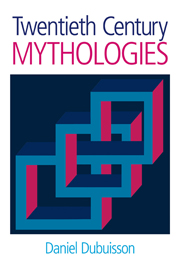Book contents
- Frontmatter
- Epigraph
- Contents
- Foreword by Professor Robert A. Segal
- Preface
- Abbreviations
- Introduction: History and comparative epistemology
- Part I Georges Dumézil, or Society
- Part II Claude Lévi-Strauss, or the Mind
- Part III Mircea Eliade, or the Sacred
- Conclusion: Modern theories of myth and the history of Western thought
- Bibliography
- Index
Foreword by Professor Robert A. Segal
- Frontmatter
- Epigraph
- Contents
- Foreword by Professor Robert A. Segal
- Preface
- Abbreviations
- Introduction: History and comparative epistemology
- Part I Georges Dumézil, or Society
- Part II Claude Lévi-Strauss, or the Mind
- Part III Mircea Eliade, or the Sacred
- Conclusion: Modern theories of myth and the history of Western thought
- Bibliography
- Index
Summary
Daniel Dubuisson's Twentieth-Century Mythologies was originally published in 1993 as Mythologies du XXe siècle: Dumézil, Eliade, Lévi-Strauss. As the author reports in his preface to the present, expanded, English edition, the original edition caused a stir, but mainly over the exposé of the unsavoury political views underlying Mircea Eliade's theory of myth and of religion. As important as that exposé continues to be, more important is the project that unites his study of Dumézil, Lévi-Strauss, and Eliade.
Dubuisson is intent on working out the basic assumptions of the three theories he considers. He wants to show that the theories are theories not merely of myth but of something larger, of which myth is an expression. Dumézil's theory of myth rests on a view of society. Lévi-Strauss's theory of myth rests on a view of the mind. Eliade's theory of myth rests on a political ideology. Dubuisson does not merely lay out the fundamental tenets of each theory but also evaluates them. Rigorously and relentlessly, he subjects them all to criticism.
The typical way to evaluate theories is by applying them: if they work, the theories are confirmed. Here the tenets of the theories are presupposed, and the test is whether the theories fit the myths to which they are applied. For example, does Freud's theory fit a particular myth once one grants the existence of the Oedipus complex? This approach is still a test of theories, for if the theory does not fit, the theory must explain why.
- Type
- Chapter
- Information
- Twentieth Century Mythologies , pp. ix - xivPublisher: Acumen PublishingPrint publication year: 2006



